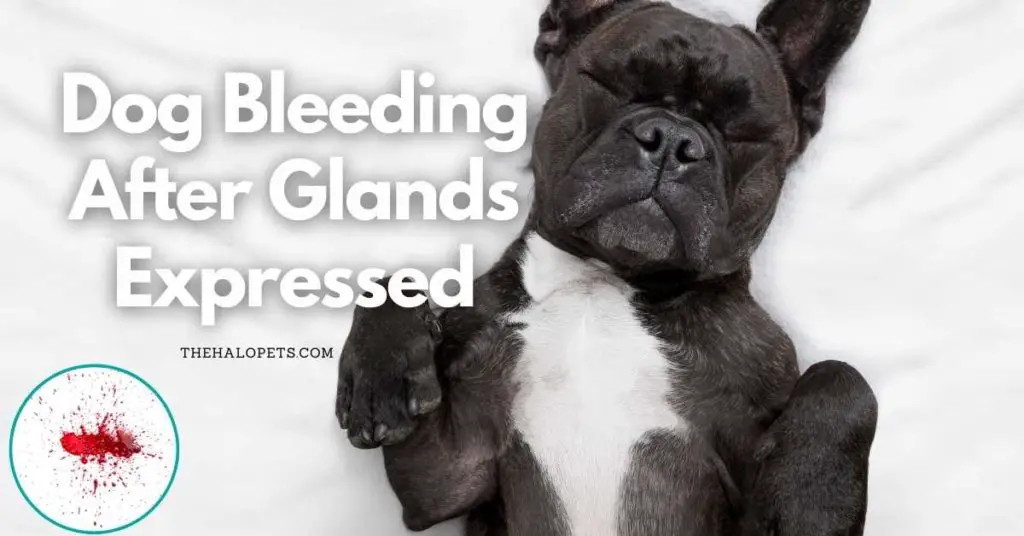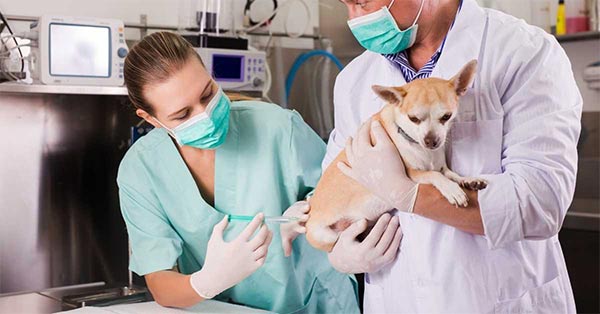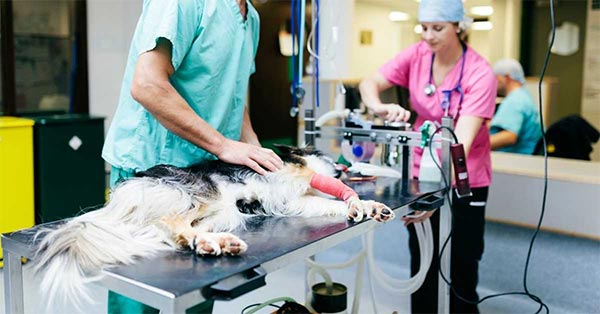Though anal gland expression can be done naturally and manually in dogs, it can sometimes cause serious issues as well. So, if you see your Dog Bleeding After Glands Expressed and do not know what to do, this article is your savior.
In this article, we will cover:
- Dog Bleeding After Glands Expressed
- Is My Dog’s Anal Glands Ruptured Or Infected?
- Symptoms Of Bleeding Anal Glands
- And more…

Dog Bleeding After Glands Expressed
Bleeding after anal glands are expressed in dogs happens as a result of an anal sac abscess or infection in dogs. If not treated timely, the glands can rupture further and cause more bleeding in your dogs. This requires medical intervention at the earliest.
There are three stages of anal gland diseases in dogs- impaction, inflammation, and abscess. The blood basically appears when your dog reaches the second stage i.e. anal gland inflammation.
1. Impaction of the Anal Sac
Anal sac impaction, the initial stage of anal sac illness, occurs when liquid gathers and thickens in the anal sacs, making them large, heavy, and difficult to empty. Squeezing the anal sacs one by one until the thicker substance is expressed and your dog’s glands are fully emptied usually relieves the impaction.
2. Inflammation of the Anal Sac
The second stage of the condition is anal vasculitis or inflammation of the anal sac. At this point, the anal sac material or secretions continue to collect. The nasty bacteria will proliferate and infect your dog’s glands over time. The impacted fluid may become thin and fill with pus or blood at this point.
3. Anal Gland Abscess

The final stage is where your dog starts leaking blood from his anus. In this stage of the disease, a large red hole will appear near your dog’s rectum as the abscessed sac ruptures. It’s exactly where you’ll see blood oozing out from your dog’s anus.
Also Read: 8 Reasons Why is my Dog in Pain After Glands Expressed? +6 Tips
Is My Dog’s Anal Glands Ruptured Or Infected?
The real problem of anal gland disease is the rupturing of the glands once they have become infected. Dogs will release blood when the glands have ruptured or are about to rupture.
Your dog’s glands can be infected if they are obese, have food allergies, inflammation of the anal sacs, tumors, skin infestations, chronic skin disease, abnormal functioning of the sphincter, and environmental allergies.
So, it is the most painful and uncomfortable time for your dog. You need to take your dog immediately to a vet if you suspect the glands have ruptured.
The vet will usually sedate the dog and flush out all the discharge from the anal glands, clean the surrounding areas off pus and blood and finally give them proper antibiotics for recovery.
The recovery might take some time depending on your dog’s type. So, you have to be patient and cooperative with your dog. Most importantly, make sure you give all the medicines on time.
Symptoms Of Bleeding Anal Glands
Most dogs can carry on with their lives without any problems in the anal sacs, but some unlucky ones do not get this pleasure. They suffer from anal gland diseases that require care and proper treatment.
When the glands become impacted, there is a bacteria build-up causing severe infections. It might also lead to anal gland abscess, the last stage of progressive anal sac disease that causes the bleeding.
This also happens when your dog is not applying the required pressure on the anal sacs to empty them. It is because your dog’s stools aren’t firm. Rather, they are loose and mushy.
As a result of all this, you will see other symptoms in your dog too. These symptoms include:
- Scooting over the floor or lawn
- Trying to chew the butt
- Scratching the back
- Excessively licking the back
- Irritation and Discomfort
- Foul Smell
However, if the condition of your dog is severe, additional symptoms are seen:
- Fluid Drainage from the rectum of your dog
- Unique bulges on the opening of your dog’s anal sac
- More than one abscess or tear in the area
Once you notice a combination of these symptoms, take your dog to the vet and let him examine the dog. Do not try to manually express your dog’s glands at home if you are unsure. It could lead to ruptured glands and intensive bleeding.
How To Treat Bleeding From Anal Glands?
Impacted anal glands can become horribly infected if left untreated. Therefore, it is necessary to treat anal glands to stop bleeding. This procedure entails a few phases that should be closely watched by a veterinarian as they can guide you best in this regard.
1. Expressing The Glands Manually
When the dog is bleeding after anal glands are expressed, it is most likely due to impacted and infected anal glands. As a result, the vet will have to manually express the glands to treat him further.
At times, when the infection is severe, the dog’s bum becomes very sore. Thus, your veterinarian might have to sedate your dog to perform the procedure.
Also Read: Can I Put Sudocrem On My Dog’s Bum? 4 Pros + 4 Alternatives
2. Prescribing Antibiotics
Your veterinarian will then prescribe antibiotics based on the situation of your dog. Sometimes, they even inject the antibiotics directly into the anal glands too.
Ointments like nystatin combinations are generally recommended for topical use by vets. According to Dr Raina Gollakner, DVM at the VCA Hospitals, the Nystatin combinations are available under different brand names like Panalog, Dermalog, Derma-vet etc. They are used to treat inflammatory skin conditions and skin lesions in dogs.
The vets apply this ointment by opening the cap and placing the tip of the tube inside the opening of your dog’s anal glands. Then, they press the ointment tube and fill the entire anal glands.
Additionally, vets also provide oral antibiotics to reduce the infection and soothe your dog’s skin. You should give the doses timely to your dog. If you do follow the instructions by your vet, your dog’s anal glands will heal in two weeks.
3. Surgical Lancing

Infected anal glands can abscess, requiring surgical lancing to clear out and remove the infection. The wound will heal from the inside out if the incision is left exposed.
The vet will also prescribe some antibiotics for your dog based on the type of bacteria that has impacted your dog’s anal glands.
Additionally, as a pet parent, you need to make sure your dog lets the tissue heal properly. So, avoid any exercise or strenuous activity with your dog during this time.
What Are Some Home Remedies For Dog Bleeding Anus?
The immediate thing to do when you spot blood oozing out of your dog’s back is to call a veterinarian. He will be able to prescribe antibiotics for your dog so that the anal sac infection heals quickly.
However, you can take a few steps to make sure your dog feels comfortable at home till you go to the veterinarian. First, clean the butt of your dog and inspect the area.
If you see any swelling, apply a warm compress to the area for ten to fifteen minutes at least two times a day for faster healing of the infection. You can also soak a cloth in warm water and let your dog sit on it.
To divert your dog’s attention from the butt so that he sits quietly in one place and does not continuously bite or lick the area, chew toys will come in handy. They will keep your dog busy and hence it will be easier for you to inspect the area and treat it.
If you are looking for a good chew toy for your dog, No products found. is available for all breeds in all sizes. It has a 100% real bacon flavor to it, so your dog will absolutely love it.
How To Prevent Bleeding After Anal Glands Expressed? Top 2 Ways
Bleeding after anal glands are expressed is a result of improper gland functioning. As a result, the glands do not empty fully and become infected with a bacteria. However, you can prevent your dog from reaching this stage by following some tips:
1. Routine Anal Gland Expression
The best thing you can do is routinely express your dog’s anal glands if they are not doing so naturally. You can either learn how to express anal glands yourself or have your veterinarian do it for your dog.
Generally, a vet is more trained than us. Thus, they are able to empty the anal sacs entirely after examining the anal sacs and rectum. Else, you can book an appointment with a pet groomer and have them do it for you!
However, if you wish to do it yourself, make sure you learn the procedure beforehand from your groomer or vet. They will demonstrate to you what and how your dog’s anal glands need to be expressed manually. So, you do not cause harm to the sacs by constantly squeezing or massaging them.
2. Proper Diet Plan

As a pet parent, you must be far-sighted and look for long-term solutions for your pets. To avoid anal gland disease, you can start by making your dog active and following a healthy diet for him.
A high-fiber diet is what we would recommend for your dog so that they are able to maintain their stool consistency and defecate without any difficulty. You can include sweet potatoes, pumpkins, beet pulp, lettuce, apples, and green beans in your dog’s diet to make sure they get the right amount of fibers.
If you are looking for some supplements, probiotics, and dog food for your furry friend, we recommend No products found. for the gut health of your dog.
Additionally, you can feed them Psyllium as well. It is a soluble fiber that can treat irregular bowel movements in dogs. However, avoid flavored and non-FDA approved food for your dogs as they can do more harm than good.
Also Read: A Guide To Getting Your Dog’s Diet Right
Can Bleeding Recur in Dogs After Anal Glands Are Expressed Again?
Anal Gland diseases are recurring in nature. It means that they can happen again after your dog’s anal glands are expressed in dogs. Thus, this is not a one-time thing for any pet dog.
Particularly, obese or overweight dogs suffer from anal gland impaction or infection after anal glands are expressed. Each anal gland expression in such dogs can cause scarring or abscesses. As a result, you might see blood coming out of your dog’s anus every time after glands are expressed.
Although it is treatable by the veterinarian with some medications for stool consistency and diarrhea and a proper diet plan, there are still some dogs who would require anal gland removal surgery. Thus, have a word with your vet and follow the course of action they tell you to.
Should I Get My Dog’s Anal Glands Removed?

Anal gland removal is a specialized and delicate surgery for your dog. It is a surgery that provides a permanent solution to anal gland diseases such as infection, inflammation, and an abscess that might occur repeatedly.
However, although some veterinarians take up this surgery regularly, you must consult your vet before proceeding with one. Just like every surgery, anal gland removal also has its cons.
First, anal gland removal surgery will require some stitches in your dog’s anus after the procedure is done. These stitches are always at a risk of infection till your dog completely heals.
Second, Tammy Hunter, DVM, and Ernst Ward, DVM at the VCA Hospitals, say that for around one to three weeks after surgery, some dogs will have watery stools or difficulty in bowel control. It is because the nerves that regulate the anal sphincters get wounded during the surgeries if there is a severe progression of anal sac disease in the glands.
In the vast majority of pets, this damage heals itself within a few days. In rare and worst-case circumstances, irreversible nerve injury can cause fecal incontinence. It is the inability to control bowel motions, resulting in continual stool flow from your dog’s anus everywhere in the house.
So, while you will get the surgery to solve one problem, you might end up with another in this case. In brief, we would recommend you to consult your dog’s veterinarian about all the harms and benefits of the surgery for your dog and follow their advice.

